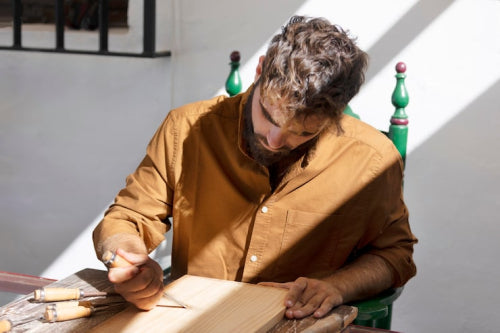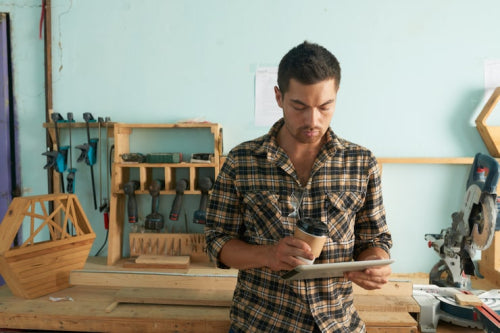In a Jaipur workshop, an artisan smooths a rosewood panel, its deep grain glowing under the afternoon sun. This scene, mirrored across India's woodworking hubs, signals a renaissance for natural wood furniture in 2025. From Mumbai's sleek penthouses to Chennai's coastal villas, handcrafted wooden pieces are redefining luxury with their blend of sustainability and artistry. MMC Wood Creations, a leader in India's furniture scene, is driving this shift, crafting bespoke designs that marry tradition with modern elegance, captivating homeowners in cities like Bangalore, Hyderabad, and beyond.
Mass-market furniture lacks heart, filling rooms with bland, short-lived pieces. Frequent breakdowns spark frustration, as replacements erode style and sentiment. At MMC Wood Creations, Udaipur artisans shape heirloom furniture with enduring craftsmanship and cozy elegance, creating pieces that echo your identity, ensuring your home radiates warmth and timeless connection. Shop Now!
Natural Woods Leading 2025 Styles: Craftsmanship Meets Sustainability
Wood's timeless appeal lies in its unique imperfections knots and grains that whisper stories of forests and time. The global market for wood and timber products, valued at USD 992.43 billion in 2024, is expected to grow to USD 1,251.26 billion by 2030, with a compound annual growth rate (CAGR) of 4.7% from 2025 onward. India, part of the dominant Asia-Pacific market holding a 31.8% share in 2024, is a key player. In urban centers like Bangalore and Pune, MMC Wood Creations reports soaring demand for teak and rosewood furniture, prized for their durability and rich hues. These woods anchor interiors with a warmth that synthetic materials can't replicate.
In Kolkata and Chennai, mango wood is gaining favor for its affordability and golden tones. A Chennai designer recently crafted a dining set from reclaimed mango wood for a Besant Nagar home, its natural flaws celebrated as marks of character. In Ahmedabad, walnut's sophisticated, dark grain is a favorite among minimalist elites, while Hyderabad's tech-savvy buyers lean toward sleek teak pieces. MMC's artisans, trained in Rajasthan's storied woodworking traditions, ensure each piece is unique, resonating with consumers seeking authenticity in a mass-produced world.
Trends Defining the Wood Renaissance
Three trends are shaping 2025's furniture landscape: sustainability, hybrid aesthetics, and tactile craftsmanship. Sustainability is paramount, especially in eco-conscious cities like Bangalore and Mumbai. The wood-based panel market, valued at USD 277.40 billion in 2025, is projected to reach USD 462.56 billion by 2033, growing at a 6.6% CAGR, driven by demand for eco-friendly materials like plywood and medium-density fiberboard (MDF). MMC sources 85% of its timber from sustainable plantations in Karnataka and Kerala, responding to consumer demand for Forest Stewardship Council (FSC)-certified woods.
Hybrid designs are another cornerstone. In Jaipur, artisans blend intricate carvings with minimalist, Scandinavian-inspired forms. A Mumbai architect recently commissioned MMC for a rosewood console that pairs floral inlays with clean lines, creating a piece that feels both heritage-rich and contemporary. This fusion appeals to younger buyers in Pune and Hyderabad, who crave cultural depth without dated opulence. Tactile finishes, such as matte oils that highlight wood's natural texture, are also trending. In Chennai, oiled mango wood cabinets add understated elegance to coastal homes, their surfaces begging to be touched.
Case Studies: Wood's Place in Indian Homes
In Pune, a tech couple furnished their compact flat with an MMC acacia bedframe, its live-edge design sourced from a salvaged Maharashtra tree, embodying the brand's upcycling ethos. In Kolkata, a heritage bungalow's sheesham wood dining table, its deep brown finish echoing colonial charm, showcases MMC's versatility. These pieces highlight how MMC tailors designs to diverse tastes, from urban minimalists to traditionalists.
In Ahmedabad, a corporate leader's penthouse features a walnut coffee table, its sleek design nodding to global trends while rooted in Gujarat's woodworking heritage. In Chennai, a mango wood bar cabinet, its wave-like grain evoking the Bay of Bengal, graces a seaside villa. Hyderabad's tech parks are also embracing MMC's reclaimed teak for office furnishings, blending sustainability with sophistication. These examples underscore MMC's knack for crafting localized, meaningful designs.
Challenges Facing the Industry
The wood revival faces hurdles. The engineered wood market, set to grow by USD 7.46 billion at a 7.1% CAGR through 2029, grapples with volatile raw material prices, particularly for softwood lumber. In Mumbai and Bangalore, supply chain disruptions have spiked teak costs by 15% since 2024. MMC mitigates this through strong supplier ties in Kerala, but smaller artisans struggle. Labor shortages are another issue Jaipur's woodworking guilds have seen a 25% drop in skilled carvers over the past decade as younger generations chase tech jobs. MMC counters this with apprenticeship programs, preserving traditional techniques.
Consumer education remains a challenge. In Hyderabad and Pune, fast furniture's low prices tempt budget-conscious buyers. MMC combats this with transparency, providing certificates detailing each piece's wood origin and artisan story, building trust. In southern Georgia, as noted in a 2025 timber outlook, pine sawtimber prices fell 9% in Q3 2024 to their lowest since 2020, reflecting global supply pressures that could affect India's import costs.
Opportunities for Expansion
E-commerce is a major opportunity. India's online furniture market is projected to reach USD 3.5 billion in 2025, with Bangalore and Mumbai leading adoption. MMC's website, featuring 3D wood grain previews, allows Chennai and Kolkata buyers to visualize custom pieces. Instagram campaigns showcasing Jaipur workshops have boosted inquiries by 30%, tapping into social media's reach. Collaborations with architects are also thriving MMC furnished a sustainable Ahmedabad office with reclaimed teak desks, while similar projects in Hyderabad's tech hubs and Mumbai's luxury towers signal growing corporate demand.
Innovative materials offer another avenue. The rise of engineered woods like plywood and OSB, noted for their strength and cost-effectiveness, allows MMC to offer affordable yet durable pieces for middle-class homes in Kolkata and Pune. By blending tradition with technology, MMC is well-positioned to capture India's expanding furniture market.
A Legacy Carved in Wood
As dusk falls over a Hyderabad showroom, a teak table gleams under soft lights, its grain a testament to nature's artistry. MMC Wood Creations isn't just crafting furniture; it's sustaining a legacy while embracing 2025's demands for eco-conscious, authentic design. From Jaipur's workshops to Bangalore's lofts, natural wood furniture is more than a trend it's a movement toward durability and meaning. As India's urban homes evolve, MMC's handcrafted pieces invite us to reconnect with craftsmanship, to feel the weight of a story in every knot and curve, and to build spaces that endure.
Frequently Asked Questions
What types of natural wood are trending for furniture in 2025?
Teak and rosewood are leading the market in 2025, particularly in urban Indian cities like Bangalore and Mumbai, prized for their durability and rich hues. Mango wood is gaining popularity in Chennai and Kolkata for its affordability and golden tones, while walnut's sophisticated dark grain appeals to minimalist buyers in Ahmedabad and Hyderabad. These woods are valued for their unique grains and sustainable sourcing from FSC-certified plantations.
Why is sustainable wood furniture becoming more popular in 2025?
The wood-based panel market is projected to reach USD 462.56 billion by 2033, driven by growing consumer demand for eco-friendly materials like FSC-certified woods. Eco-conscious buyers, especially in cities like Bangalore and Mumbai, are prioritizing furniture made from sustainably sourced timber, with companies like MMC Wood Creations sourcing 85% of their timber from sustainable plantations in Karnataka and Kerala. This shift reflects a broader movement toward durability, authenticity, and environmentally responsible design choices.
What are the main challenges facing the natural wood furniture industry in 2025?
The industry faces volatile raw material prices, with teak costs rising by 15% since 2024 due to supply chain disruptions, and a shortage of skilled artisans as younger generations move toward tech careers. Consumer education remains crucial, as budget-conscious buyers are often tempted by cheaper fast furniture options. Companies are addressing these challenges through strong supplier relationships, apprenticeship programs to preserve traditional woodworking techniques, and transparency initiatives that document each piece's origin and craftsmanship story.
Disclaimer: The above helpful resources content contains personal opinions and experiences. The information provided is for general knowledge and does not constitute professional advice.
You may also be interested in: The Growing Demand for Multi-Functional Furniture
Mass-market furniture lacks heart, filling rooms with bland, short-lived pieces. Frequent breakdowns spark frustration, as replacements erode style and sentiment. At MMC Wood Creations, Udaipur artisans shape heirloom furniture with enduring craftsmanship and cozy elegance, creating pieces that echo your identity, ensuring your home radiates warmth and timeless connection. Shop Now!
Powered by flareAI.co




